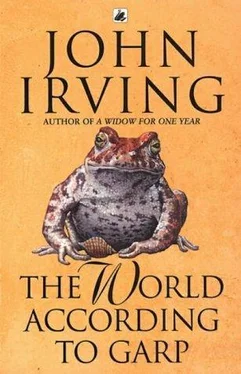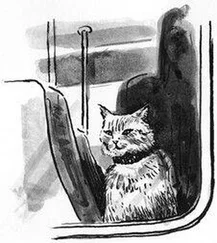“An unpublished writer?” he asked. Garp was rather glum about it. “Then what do you do for a living?” the policeman said.
“My wife and my mother support me,” Garp admitted.
“Well, I have to ask you what they do,” the policeman said. “For the record, we like to know how everyone makes a living.”
The offended gentleman with the white mustache, who had overheard only the last bits of this interrogation, said, “Just as I would have thought! A vagrant, a despicable bum!”
The policeman stared at him. In his early, unpublished years Garp felt angry whenever he was forced to admit how he had enough to live on; he felt more like inviting confusion at this moment than he felt moved to clear things up.
“I'm glad to see you've caught him, anyway,” the old gentleman said. “This used to be a nice park, but the people who get in here these days—you ought to patrol it more closely,” he told the policeman, who guessed that the old man was referring to the child molester. The cop didn't want the business discussed in front of the child, so he rolled his eyes up toward her—she sat rigid in the saddle—and tried to indicate to the old gentleman why he shouldn't continue.
“Oh no, he didn't do it to that child! ” the man cried, as if he'd just noticed her, mounted beside him, or just noticed she was not dressed under the policeman's coat—her small clothes bugged in her arms. “How vile!” he cried, glaring at Garp. “How disgusting! You'll want my name, of course?” he asked the policeman.
“What for?” the policeman said. Garp had to smile.
“Look at him smirking there!” the old man cried. “Why, as a witness , of course—I'd tell my story to any court in the country, if it could condemn such a man as that!”
“But what were you a witness to?” the policeman said.
“Why, he did that...thing...to me , too!” the man said.
The policeman looked at Garp; Garp rolled his eyes. The policeman still clung to the sanity that the old gentleman was referring to the child molester, but he didn't understand why Garp was being treated with such abuse. “Well, sure,” the policeman said, to humor the old fool. He took his name and address.
Months later Garp was buying a package of three prophylactics when this same old gentleman walked into the drugstore.
“What?! It's you !” the old man shouted. “They let you out already, did they? I thought they'd put you away for years! ”
It took Garp a moment to recognize the person. The druggist assumed that the old codger was a lunatic. The gentleman in his trimmed, white mustache advanced cautiously on Garp.
“What's the law coming to?” he asked. “I suppose you're out on good behavior? No old men or young girls to sniff in prison, I suppose! Or some lawyer got you off on some slick technicality? That poor child traumatized for all her years and you're free to roam the parks!”
“You've made a mistake,” Garp told him.
“Yes, this is Mr. Garp,” the druggist said. He didn't add, “the writer.” If he'd considered adding anything, Garp knew, it would have been “the hero,” because the druggist had seen the ludicrous newspaper headlines about the crime and capture in the park.
UNSUCCESSFUL WRITER NO FAILURE AS HERO!
CITIZEN CATCHES PARK PERVERT;
SON OF FAMOUS FEMINIST HAS KNACK FOR HELPING GIRLS...
Garp was unable to write for months because of it, but the article impressed all the locals who knew Garp only from the super-market, the gymnasium, the drugstore. In the meantime, Procrastination had been published—but almost no one seemed to know. For weeks, clerks and salespeople would introduce him to other customers: “Here's Mr. Garp, the one who nabbed that molester in the park.”
“What molester?”
“That one in city park. The Mustache Kid. He went after little girls.”
“Children?”
“Well, Mr. Garp here is the one who got him.”
“Well, actually,” Garp would say, “it was the policeman on his horse.”
“Knocked all his teeth down his throat, too!” they would crow with delight—the druggist and the clerk and the salespeople here and there.
“Well, that was actually the horse,” Garp admitted, modestly.
And sometimes someone would ask, “And what is it you do , Mister Garp?”
The following silence would pain Garp, as he stood thinking that it was probably best to say that he ran —for a living. He cruised the parks, a molester-nabber by profession. He hung around phone booths, like that man in the cape—waiting for disasters. Any of this would make more sense to them than what he really did.
“I write,” Garp would finally admit. Disappointment—even suspicion—all over their once-admiring faces.
In the drugstore—to make matters worse—Garp dropped the package of three prophylactics.
“ A-ha !” the old man cried. “Look there! What's he up to with those?”
Garp wondered what options there were for what he could be up to with those.
“A pervert on the loose,” the old man assured the druggist. “Looking for innocence to violate and defile!”
The old geezer's self-righteousness was irritating to the point that Garp had no desire to settle the misunderstanding; in fact, he rather enjoyed the “memory of unpantsing the old bird in the park and he was not in the least sorry for the accident.
It was some time later when Garp realized that the old gentleman had no monopoly on self-righteousness. Garp took Duncan to a high school basketball game and was appalled that the ticket-taker was none other than the Mustache Kid—the real molester, the attacker of that helpless child in the city park.
“You're out ,” Garp said, amazed. The pervert smiled openly at Duncan.
“One adult, one kiddy,” he said, tearing off tickets.
“How'd you ever get free?” Garp asked; he felt himself tremble with violence.
“Nobody proved nothing,” the kid said, haughtily. “That dumb girl wouldn't even talk .” Garp thought again of Ellen James with her tongue cut off at eleven.
He felt a sudden sympathy for the madness of the old man he had so unpleasantly unpantsed. He felt such a terrible sense of injustice that he could even imagine some very unhappy woman despairing enough to cut off her own tongue. He knew that he wanted to hurt the Mustache Kid, on the spot—in front of Duncan. He wished he could arrange a maiming as a kind of moral lesson.
But there was a crowd wanting basketball tickets; Garp was holding things up.
“Move along, hair pie,” the kid said to Garp. In the kid's expression, Garp thought he recognized the leer of the world. On the kid's upper lip was the insipid evidence that he was growing another mustache...
It was years later when he saw the child, a girl grown up; it was only because she recognized him that he recognized her. He was coming out of a movie theater in another town; she was in the line waiting to come in. Some of her friends were with her.
“Hello, how are you?” Garp asked. He was glad to see she had friends. That meant, to Garp, that she was normal.
“Is it a good movie?” the girl asked.
“You've certainly grown!” Garp said; the girl blushed and Garp realized what a stupid thing he'd said. “Well, I mean it's been a long time—and it was a time well worth forgetting!” he added, heartily. Her friends were moving inside the movie theater and the girl gave a quick look after them to make sure she was really alone with Garp.
“Yes, I'm graduating this month,” she said.
“High school?” Garp wondered aloud. Could it have been that long ago?
Читать дальше












